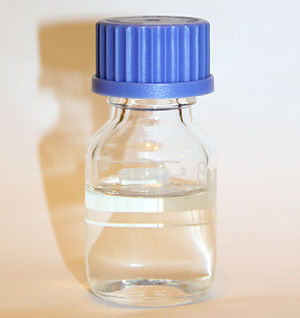Difference between revisions of "Propylene carbonate"
| Line 1: | Line 1: | ||
[[File:Sample of propylene carbonate.jpg|thumb|Lab grade propylene carbonate]] | [[File:Sample of propylene carbonate.jpg|thumb|Lab grade propylene carbonate]] | ||
| − | '''Propylene carbonate''' (often abbreviated PC) is an organic compound with the formula CH<sub>3</sub>C<sub>2</sub>H<sub>3</sub>O<sub>2</sub>CO. It is a carbonate ester derived from propylene glycol. This colorless and odorless liquid is useful as a polar, aprotic solvent. Propylene carbonate is chiral but is used exclusively as the racemic mixture. | + | '''Propylene carbonate''' (often abbreviated '''PC''') is an organic compound with the formula CH<sub>3</sub>C<sub>2</sub>H<sub>3</sub>O<sub>2</sub>CO. It is a carbonate ester derived from propylene glycol. This colorless and odorless liquid is useful as a polar, aprotic solvent. Propylene carbonate is chiral but is used exclusively as the racemic mixture. |
==Properties== | ==Properties== | ||
Revision as of 14:18, 6 September 2015
Propylene carbonate (often abbreviated PC) is an organic compound with the formula CH3C2H3O2CO. It is a carbonate ester derived from propylene glycol. This colorless and odorless liquid is useful as a polar, aprotic solvent. Propylene carbonate is chiral but is used exclusively as the racemic mixture.
Contents
Properties
Chemical
Propylene carbonate is often used as a solvent for electrolysis.
Physical
Propylene carbonate is a colorless liquid freezing at -48.8°C and boiling at 242°C. Propylene carbonate has a vapor pressure of 0.13 mmHg at 20°C, and 0.98 mmHg at 50°C[1].
Availability
Propylene carbonate is sold by chemical suppliers or can sometimes be found on eBay.
Preparation
PC can be prepared from 1,2-propylene glycol and a metal carbonate. Described here: [1]
Projects
- PC can be used for the electrodeposition of the alkali metals at STP as seen here.
Handling
Safety
Propylene glycol has little toxicity.

